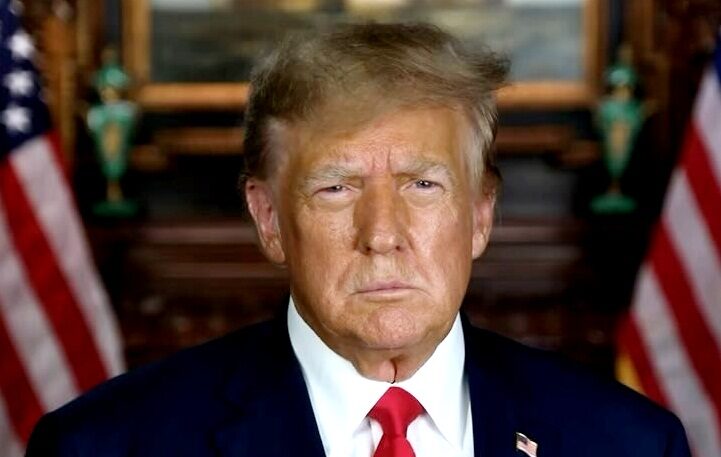The debate between Donald Trump and Kamala Harris on an all-blue stage, with lines from the U.S. Constitution emblazoned on the background, was filled with evasive answers, insults—both subtle and direct—and a fair amount of name-calling.
Two significant moments stood out during Tuesday’s debate in Philadelphia. Though the microphones were turned off to prevent interruptions, Harris at one point raised her voice while it was Trump’s turn to speak. “Wait a minute, please. I’m talking now,” Trump interjected, adding, “Does that sound familiar?” This was a nod to Harris interrupting former Vice President Mike Pence in their 2020 debate, a moment often highlighted as a show of her assertiveness.
Throughout his nearly four years as vice president under President Joe Biden, Trump taunted Harris, implying that she would simply follow Biden’s policies. “She is Joe Biden,” he said. Harris responded sharply, “I am not Joe Biden, and I am certainly not Donald Trump.” This was both an evasion and a declaration that she wanted to distance herself from Biden, whose economic policies and handling of the Afghanistan withdrawal have become points of contention for voters.
When the two candidates first met on stage, Harris extended her hand to Trump, saying, “Let’s have a good debate.” Trump replied, “Good to see you. Have fun.” Despite the cordial start, the debate quickly devolved into a series of jabs and insults that sometimes resembled a schoolyard argument.
Before the debate, Harris had warned viewers to prepare for lies. Trump accused her of being a Marxist, referring to her father, economist Donald Harris, as a Marxist too. He also accused her of copying his policies in an attempt to move to the political center, even offering to send her a “MAGA” hat, a symbol of his “Make America Great Again” campaign.
“World leaders are laughing at you,” Harris countered. Trump retorted that leaders like Russian President Vladimir Putin perceived her administration as weak, which led to the invasion of Ukraine. “That’s why,” he said, “Putin endorses her; I think he means it,” referring to what is considered a joke by the Russians.
When Harris raised the criminal case Trump was convicted in and others he still faces, including on national security, he blamed it on the “weaponization” of the justice system by Democrats. He criticized the refusal to prosecute Biden over national secrets, describing him as a “pathetic old man.”
Moderator David Muir from ABC News brought up a previous statement from Trump in which he suggested Harris only recently began identifying as Black after previously claiming to be Indian. Trump did not explain his comment but shrugged it off, saying, “I couldn’t care less. Whatever she wants to be is OK with me.” Harris responded, “I think it’s a tragedy that we have someone who wants to be president, who has consistently, throughout his career, attempted to use race to divide the American people.” She added, “We don’t want a leader who is constantly trying to have Americans point their fingers at each other.”
Harris took a jab at Trump’s rally size, suggesting attendees would rather hear about “Hannibal Lecter, a fictional serial-killing cannibal, and cancer-causing windmills” than Trump’s policies. Trump shot back, saying, “People don’t go to her rallies,” implying her crowds were filled by “rent-a-crowd.”
The debate, held in Independence Hall in Philadelphia—an iconic location where the Declaration of Independence was signed and the Constitution drafted—shifted to the topic of threats to democracy. Trump denied he had instigated the mob that stormed the Capitol on January 6, 2021, while Congress was certifying Biden’s election. He argued that democracy was instead threatened by the influx of illegal immigrants and claimed Harris’s nomination nullified Biden’s 14 million primary votes since he was “pushed out.”
In a bizarre claim, Trump insisted that illegal Haitian migrants were eating people’s pets in Springfield, Ohio. Although his running mate, JD Vance, first mentioned this, Vance later admitted it was a rumor. Muir pointed out that local officials had denied these reports, yet Trump did not retract his statement.
Trump remained mostly serious, sometimes stoic, while Harris often turned towards him with facial gestures mocking him and laughing. Harris had put in days of preparation with mock debates, whereas Trump relied on his campaign style, resulting in a notable difference in their presentations. Harris, appearing more rehearsed, made studious notes during the debate, while Trump spoke extemporaneously.
On challenging topics, both candidates avoided direct answers. Harris dodged Trump’s questions on whether she would support restrictions on late-term abortions, saying only that mentioning the ninth month was an insult to women. Trump avoided stating whether he would veto a national abortion ban, reiterating his stance to leave it to the states. Harris also didn’t address why her proposed policies had not been enacted during her administration’s tenure and why there was a delay in tightening border controls until six months before the election. Trump similarly evaded questions on how he would deport all illegal immigrants.
The debate showcased their differences, not only in policy but in style and approach, setting the stage for what is sure to be a contentious election season.











